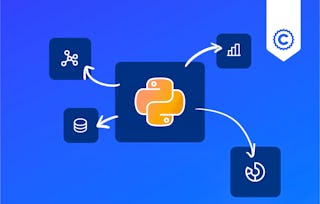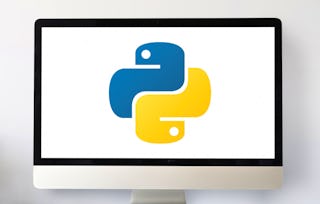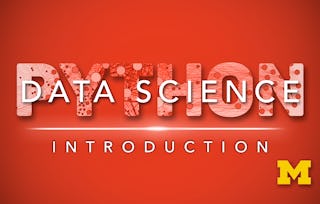Maîtrisez Python pour la science des données avec des projets pratiques. Apprenez Pandas, les statistiques et la visualisation pour résoudre des problèmes d'affaires du monde réel. Développez des compétences prêtes à l'emploi en matière de Data wrangling, d'Analyse exploratoire des données (AED) et de graphiques avec matplotlib/seaborn - aucune expérience préalable n'est requise. Ce cours pour débutants vous guide dans le nettoyage des données désordonnées, l'application de statistiques descriptives et déductives, et la préparation d'ensembles de données pour l'Apprentissage automatique. Vous concevrez des analyses qui répondent à des questions commerciales, communiquerez des informations à l'aide de visuels convaincants et effectuerez des évaluations difficiles alignées sur des scénarios professionnels.

Python pour la science des données

Python pour la science des données
Ce cours fait partie de Science des données fractales Certificat Professionnel
Enseigné en Français (doublage IA)

Instructeur : Fractal Analytics Academy
7 340 déjà inscrits
Inclus avec
99 reviews
Expérience recommandée
Ce que vous apprendrez
Construisez des pipelines pandas pour nettoyer, transformer et agréger des ensembles de données du monde réel.
Effectuer des AED et calculer des statistiques descriptives pour résumer la qualité et le comportement des données.
Appliquer des tests d'hypothèse (t-test/khi carré) et interpréter les résultats en vue de prendre des décisions commerciales.
Créez des graphiques de qualité (barres/lignes/boîtes/cartes thermiques) avec Matplotlib et Seaborn.
Compétences que vous acquerrez
- Catégorie : Science des données
- Catégorie : Nettoyage des données
- Catégorie : Matplotlib
- Catégorie : Transformation de données
- Catégorie : Ingénierie des caractéristiques
- Catégorie : Analyse des Données
- Catégorie : Statistiques descriptives
- Catégorie : Seaborn
- Catégorie : Analyse de corrélation
- Catégorie : Manipulation de données
- Catégorie : Tests d'hypothèses statistiques
- Catégorie : Statistiques
- Catégorie : Jupyter
- Catégorie : Data wrangling
- Catégorie : Prétraitement de données
- Catégorie : Pandas (paquetage Python)
- Catégorie : Analyse exploratoire des données (AED)
- Catégorie : Analyse statistique
- Catégorie : Logiciel de Visualisation de Données
- Catégorie : Business Analytics
Détails à connaître

Ajouter à votre profil LinkedIn
17 devoirs
Découvrez comment les employés des entreprises prestigieuses maîtrisent des compétences recherchées

Élaborez votre expertise en Analyse des Données
- Apprenez de nouveaux concepts auprès d'experts du secteur
- Acquérez une compréhension de base d'un sujet ou d'un outil
- Développez des compétences professionnelles avec des projets pratiques
- Obtenez un certificat professionnel partageable auprès de Fractal Analytics

Il y a 5 modules dans ce cours
Dans le premier module du cours Python pour la science des données, les apprenants seront initiés aux concepts fondamentaux de la programmation Python. Le module commence par les bases de Python, couvrant des sujets essentiels tels que l'introduction à Python. Ensuite, le module se penche sur le travail avec les carnets Jupyter, un environnement interactif populaire pour l'analyse et la visualisation des données. Les apprenants apprendront à configurer les notebooks Jupyter, à créer, exécuter et gérer des cellules de code, et à intégrer du texte et des visualisations à l'aide de Markdown. En outre, le module présentera des applications réelles de Python dans la résolution de problèmes liés aux données. À la fin de ce module, les apprenants auront une bonne compréhension de Python, seront compétents dans l'utilisation des blocs-notes Jupyter pour l'analyse des données, et comprendront comment Python est utilisé pour relever les défis de la science des données dans le monde réel.
Inclus
12 vidéos6 lectures2 devoirs
À la fin de ce module, les apprenants auront acquis des compétences essentielles pour travailler avec différents types de données. Ils auront une bonne maîtrise des principes fondamentaux de la programmation Python, y compris les structures de données et les bibliothèques. Ils maîtriseront le chargement, le nettoyage et la transformation des données et seront capables d'effectuer une analyse exploratoire des données, en utilisant des techniques de visualisation des données. Ils auront également un aperçu des concepts statistiques de base, tels que les probabilités, les distributions et les tests d'hypothèse.
Inclus
32 vidéos4 lectures6 devoirs2 devoirs de programmation5 laboratoires non notés
A la fin de ce module, les apprenants auront acquis une compréhension globale des concepts statistiques, des techniques d'exploration des données et des méthodes de visualisation. Les apprenants développeront les compétences nécessaires pour identifier les modèles, les valeurs aberrantes et les relations dans les données, afin de prendre des décisions éclairées et de formuler des hypothèses. En fin de compte, ils seront capables de transformer des données brutes en informations significatives, de communiquer efficacement leurs résultats par le biais d'une narration de données et d'appliquer l'EDA à diverses applications du monde réel.
Inclus
34 vidéos1 lecture5 devoirs1 devoir de programmation4 laboratoires non notés
A la fin de ce module, les apprenants auront acquis les compétences essentielles pour transformer efficacement des données brutes et souvent désordonnées en un format structuré et approprié pour une analyse avancée. Ils maîtriseront les techniques de traitement des valeurs manquantes, d'identification et de traitement des valeurs aberrantes, d'encodage des variables catégorielles, de mise à l'échelle et de normalisation des caractéristiques numériques, et de traitement des données textuelles ou non structurées. Les apprenants sauront également détecter et traiter les incohérences des données, telles que les doublons et les erreurs. Les apprenants seront capables de traiter les données pour les rendre aptes à une analyse plus approfondie. A l'issue de ce module, A l'issue de ce module, A l'issue de ce module, A l'issue de ce module
Inclus
25 vidéos2 lectures3 devoirs1 devoir de programmation3 laboratoires non notés
À la fin de ce module, les apprenants auront acquis une compréhension approfondie de la manière de créer et d'améliorer les caractéristiques afin d'optimiser les performances des modèles d'apprentissage automatique. Ils seront capables d'identifier les variables pertinentes, de créer de nouvelles caractéristiques grâce à des techniques telles que l'encodage à une touche, le binning et l'expansion polynomiale, et d'extraire des informations précieuses à partir de données existantes, telles que des dates ou du texte, en utilisant des méthodes telles que l'extraction de caractéristiques et la vectorisation de texte. Les apprenants comprendront également le concept de mise à l'échelle et de normalisation des caractéristiques afin d'assurer la cohérence et la comparabilité des gammes de caractéristiques. Grâce à ces compétences, ils seront en mesure de façonner efficacement les données, d'amplifier leur pouvoir prédictif et de contribuer à la construction de pipelines d'apprentissage automatique robustes et performants.
Inclus
11 vidéos2 lectures1 devoir1 devoir de programmation1 laboratoire non noté
Obtenez un certificat professionnel
Ajoutez ce titre à votre profil LinkedIn, à votre curriculum vitae ou à votre CV. Partagez-le sur les médias sociaux et dans votre évaluation des performances.
Instructeur

Offert par
En savoir plus sur Analyse des Données
 Statut : Essai gratuit
Statut : Essai gratuit Statut : Essai gratuit
Statut : Essai gratuit Statut : Essai gratuit
Statut : Essai gratuitUniversity of Michigan
Pour quelles raisons les étudiants sur Coursera nous choisissent-ils pour leur carrière ?

Felipe M.

Jennifer J.

Larry W.

Chaitanya A.
Avis des étudiants
- 5 stars
66,66 %
- 4 stars
12,12 %
- 3 stars
3,03 %
- 2 stars
2,02 %
- 1 star
16,16 %
Affichage de 3 sur 99
Révisé le 18 févr. 2024
Good course. Need more in-depth details with case studies.
Révisé le 14 nov. 2023
All expert did a comprehending way of giving their knowledge for learning, a great work.
Révisé le 28 nov. 2023
Its a great course if you want to learn how to apply concepts in solving real business problems

Ouvrez de nouvelles portes avec Coursera Plus
Accès illimité à 10,000+ cours de niveau international, projets pratiques et programmes de certification prêts à l'emploi - tous inclus dans votre abonnement.
Faites progresser votre carrière avec un diplôme en ligne
Obtenez un diplôme auprès d’universités de renommée mondiale - 100 % en ligne
Rejoignez plus de 3 400 entreprises mondiales qui ont choisi Coursera pour les affaires
Améliorez les compétences de vos employés pour exceller dans l’économie numérique
Foire Aux Questions
Une introduction pratique et conviviale à Python pour la science des données axée sur le Data wrangling, les statistiques et la visualisation - des compétences que les employeurs apprécient et utilisent quotidiennement.
Les débutants et les professionnels en transition vers l'analyse des données ou l'analyse d'entreprise qui souhaitent acquérir des compétences pratiques et prêtes à l'emploi.
Nettoyez et analysez des ensembles de données avec pandas, exécutez des tests statistiques, construisez des visualisations perspicaces et préparez des données pour le ML - puis présentez des résultats qui conduisent à des décisions.
Plus de questions
Aide financière disponible,


